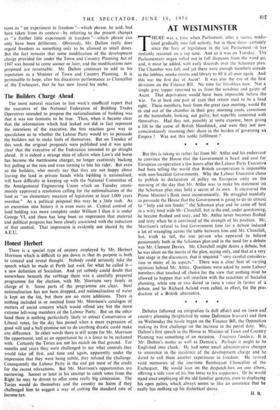The Builders Charge Ahead
The most natural reaction to last week's unofficial report that the executive of the National Federation of Building Trades Operatives intended to propose the nationalisation of building was that it was too fantastic to be true. Then, when it became clear that the information which had leaked out did in fact represent the intentions of the executive, the first reaction gave way to speculation as to whether the Labour Party would try to persuade the builders not to make fools of themselves. But on Tuesday of this week the original proposals were published and it was quite clear that the executive of the Federation intended to go straight ahead. It is indeed a strange state of affairs when Low's old horse has become the mettlesome charger, no longer cautiously backing but pulling at the rein and even turning to bite his rider. But even so the builders, who merely say that they are not happy about leaving the land in private hands while building is nationalised, will have difficulty in keeping up with the National Committee of the Amalgamated Engineering Union which on Tuesday unani- mously approved a resolution calling for the nationalisation of the land as " an elementary measure of legislation at least 1,000 years overdue." As a political proposal this may be a little rash. As an excursion into history it is even more so. Central control of land holding was more complete under William I than it is under George VI, and there has long been an impression that material and political progress has been closely associated with the reduction of that control. That impression is evidently not shared by the A.E.U.




































 Previous page
Previous page